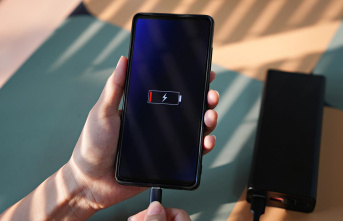Applause and Ukraine flags in the US Congress: After months of standstill, new billions in aid are within reach for Ukraine. At the weekend, the US House of Representatives approved with a bipartisan majority an aid package worth 61 billion US dollars (57 billion euros), which also includes urgently needed arms deliveries for defense against Russia. The parliamentary chamber thus followed a request from US President Joe Biden. The necessary approval from the Senate is considered certain.
The news was greeted with great relief in Ukraine and among US allies. President Volodymyr Zelensky particularly praised the Republican leader, Mike Johnson, who helped the aid package pass by putting it up for a vote in the first place. He had resisted the aid for months. Chancellor Olaf Scholz spoke of a “strong signal at this time”. NATO Secretary General Jens Stoltenberg praised the US vote as an investment in the security of the states in the military alliance.
The US House of Representatives also passed billions of dollars in aid for Israel and Taiwan. After more than two years of fighting the Russian war of aggression, Kiev is once again gaining hope of victory.
“Democracy and freedom will always have global meaning and will never fail as long as America helps protect them,” Zelensky said. "This is a decision that will save our lives." He emphasized that he sees a chance of victory if Ukraine now gets the weapons systems "that we so urgently need." These are primarily rockets with a longer range. Ukrainian Defense Minister Rustem Umyerov wrote that the whole world was waiting for this decision, "which will bring victory against the Russian aggressor closer."
US aid is enormously important for Ukraine
The USA is considered Ukraine's most important ally in the fight against the Russian invasion. Since the war began in February 2022, President Biden's administration has provided more than $44 billion in military assistance to Kyiv. There are also billions more in non-military financial aid. The package that has now been passed provides, among other things, funds for increasing the US military inventory. The money therefore goes indirectly to Ukraine, as the USA usually supplies the country attacked by Russia with equipment from its stocks. The remainder is earmarked for further military support and financial assistance in the form of loans. The text also calls for the delivery of long-range ATACMS missile systems, which Kiev is hoping for.
A number of Republicans vehemently reject further US aid to Ukraine. They argue the U.S. government should instead spend the money on securing the southern border with Mexico. This attitude was repeatedly fueled by former President Donald Trump, whose supporters in the party railed particularly loudly against aid to Ukraine. For months, the chairman of the House of Representatives, Johnson, did not move on the issue and allowed himself to be pushed along by radical party colleagues. The Republicans have a razor-thin majority in the chamber. Therefore, it is difficult to force a vote past them. Now it was Johnson who made the vote possible. He justified his change of heart by wanting to be on the right side of history.
Johnson risks job
The vote on Saturday showed how divided the Republican faction is. 112 Republicans voted against the aid package for Ukraine and 101 voted for it. Biden's Democrats, on the other hand, voted unanimously for the bill. After the vote, some MPs in the plenary waved Ukraine flags and applauded. They were called to order by the chair of the meeting. Johnson criticized MPs and said: "We should just wave a flag in the chamber." Ardent Trump supporter Marjorie Taylor Greene was outraged by the vote and the flags in the plenary. “I think every American in this country should be furious,” said the hard-right lawmaker.
Greene submitted an initial request for Johnson's deselection in March, and two other MPs later joined the party. So far she has not forced a vote on Johnson's deselection. Johnson should now breathe a sigh of relief, at least in the short term, because the 49-year-old made it clear on Saturday that she would keep her feet still for the time being. She called Johnson's behavior a "fraud." If Greene really insists on a recall vote, Johnson will likely have to rely on the Democrats' votes in the chamber to keep his job because of his group's slim majority.
The 52-year-old only took over the office, which comes third in the United States' ranking after the president and his vice president, around six months ago. The Democrats refused to support his predecessor, Kevin McCarthy. He was ousted from office in a historic vote in early October. Things could be different this time because Johnson accommodated the Democrats with the vote on Ukraine aid. In Johnson's own group, representatives like Greene are primarily interested in causing chaos. Passing laws doesn't seem to be a priority for many.
Also aid for Israel and Taiwan
It is therefore worth noting that, in addition to the Ukraine aid, other drafts have now passed the chamber. One text provides a good 26 billion US dollars for Israel. On the one hand, it is intended, for example, to finance Israel's missile defense and the US's ongoing military operations in the region. On the other hand, around $9 billion of this is intended for humanitarian support, including for the people in the Gaza Strip and other regions. Also approved are around $8 billion in support for Taiwan and the Indo-Pacific region and a text that calls for a sale of the Chinese short-video app Tiktok, as well as sanctions against Iran and the seizure of Russian assets.
Although aid for Israel was approved with a broad bipartisan majority, unlike Ukraine and Taiwan, there were also dissenting voices from the Democratic ranks. 37 Democrats and 21 Republicans voted against the package. The USA is Israel's most important protecting power and supports the country with billions of dollars every year, a significant portion of which goes towards missile defense and other military technology. Israel's behavior in the Gaza war is increasingly viewed critically, especially by Democrats. Some have called for further aid to be subject to conditions.












